9+ Reference Letter for Employment Examples to Download
There are many career-driven individuals that dream to become one of the most notable personalities in their field. But everyone starts from somewhere, and in order to become successful in your respective career, you’d need to work your way to the top of the professional ladder.
At some point in your career, you’d need a reference letter to support your application for a new job opportunity. While you could always exaggerate the truth a little by claiming to possess these skills and those expertise, but without a document to support your statement, it might be hard to convince future employers why you’d be the perfect candidate for the job. This is where a reference letter for employment could come in handy. Whether it’s for a former employee, a friend, or a colleague, it’s important to be prepared to write an effective reference letter.
Business Reference Letter for Employment Example
Formal Reference Letter for Employment Example
Professional Reference Letter for Employment Example
The Importance of a Reference Letter for Employment
Along with an application letter and resume, a reference letter provides future employers with insight regarding an applicant’s personal background and capabilities. A well-written employee reference letter gives a potential employer more than they could obtain from a simple call to the company’s human resources department. This is because writers have more time to think about what to include in the letter than in an on-the-spot conversation.
A reference letter can be beneficial to a job applicant in a variety of ways. The letter simply serves as a supporting document that verifies an individual’s past performance in order to endorse the applicant in the best light.
Endorsement
A good reference letter may also be considered as an endorsement letter written for an individual seeking for a job position. Letters that are written by people who have actually worked with you in the past provide the best insight. This includes managers, supervisors, mentors, HRs, and other colleagues who can provide credible information about you and your work ethics. This will help convince a potential employer that you left your previous company under good terms and that your were a significant contributor to the department’s workforce.
Keep in mind that an employer would want to make sure that the reference giver was in a qualified position to determine your status. So to make the letter more convincing, it’s best to include the title and a brief background of the writer.
Qualifications
When requesting for a reference letter, be sure to share significant information about the desired position with the writer. This will help them determine the set of traits and skills that need to be emphasized that directly relate to the position you’re vying for. It might be best to use specific examples that show your accomplishments as well. The body of the letter should also include the numbers of years spent at the previous company, along with the awards and credentials that you’ve earned.
You can also provide the letter writer with your biographical data, employment history, and job responsibilities for further reference.
Personal Qualities
Apart from your professional capacities, the reference letter should also explain your personal qualities that make you suitable for the new position. This includes your ability to effectively communicate both verbally and written, along with your flexibility and willingness to accept a responsibility with no complaints, and how you showed initiative to accomplish a task without supervision. You can provide a few examples of situations that support these qualities to help make the letter more meaningful.
Perception
Another reason to get a reference letter is to find out how a former employer perceives your past work. If it’s something less than favorable, then you may not want to use it for your application. Otherwise, this could hinder your chances for landing the job. But if the reference letter happens to be appropriate enough to use, then this would make it easier for a potential employer to process your application.
Short Reference Letter for Employment Example
Simple Reference Letter for Employment Example
Basic Reference Letter for Employment Example
Company Reference Letter for Employment Example
The Perfect Time to Get References
The best time to get a reference letter is before you’d actually need them. This could be at a time when you leave a school, a town, a job, and other similar instances. It might be difficult to acquire one when you’re no longer in touch with the proposed reference giver, and they might not have the freshest memory of their experience with you after a couple of months or so. By doing it at this time, you can collect a well-stocked resource of references ready to supply for immediate submission.
But how do you go about with your request?
Scrambling for a letter at the last minute is the last thing you’d want. So to help make things easier, let’s take a look at how you can professionally and effectively request for a reference.
Protocol for Requesting References
One thing to remember when requesting for a reference letter is to always be thoughtful regardless of the outcome. Creating a letter at the request of a former employee can take a good amount of time and effort from the writer’s day, which is why it’s important to make the process as easy and enjoyable as possible.
First, phrasing an open-ended question for your request will make it easier for a person to respond to. The person whom you are asking must have the opportunity to comfortably accept or decline your request for their own personal reasons. But if their response happens to be the latter, then you still need to remain considerate with their decision.
Secondly, once you receive a positive response, it’s your responsibility to provide helpful information to the writer. The writer must be made aware of the expected content, purpose, and letter format for quick and easy delivery. After the letter has been written, you can send a personal thank-you note to the writer to show your gratitude for their time and effort. This is a simple gesture that can make a person feel appreciated for what they’ve done.
Employer Reference Letter for Employment Example
Reference Letter for Employment Template Example
Standard Reference Letter for Employment Example
How to Write a Reference Letter
Reference letters can be a useful document when you apply for a job, an internship, a volunteer position, a college, or a graduate program. This serves as a positive endorsement of your skills, attributes, and achievements which may be validated by someone who is familiar with your work, such as a friend, a teacher, or a previous employer. If you happen to be an eligible candidate for providing the reference, then there a few things to remember before you begin writing.
Think before agreeing.
Some people admit to saying “yes” to everything just to be polite. But a reference letter is a vital document that could influence a reader’s perception toward you, which is why you need to make sure that you can produce a positive letter before you agree to this request. Turning down a request might seem disappointing to the opposite party, but it’s a lot better to say “no” than to provide a negative reference that won’t help polish a person’s image.
If possible, you can suggest somebody in position who might agree to the request.
Get the details.
It might be a good idea to ask for a copy of the person’s resume or application to use as a point of reference. This ensures that the information you provide stays updated, including your current achievements and credentials. You can also ask for a copy on the job posting to tailor the letter according to a specific employment opportunity. Similarly, if you’re creating a student recommendation letter, you can ask for key information on the school and program offered. You must also know all the details on how the letter may be sent to its intended recipient.
What to Include
Unless you’re given a form to fill out to make the recommendation, you need to create a formal letter for the reference. But remember, a lengthy letter isn’t going to do you any favors. To ensure that the letter stays clear and concise, make sure it contains the following points:
- Contact Details – If the letter is addressed to a specific individual or committee, then be sure to include their contact information at the top part of the letter.
- Greetings – If your recipient’s name is available, then you may use a formal salutation such as “Dear Mr./Ms./Mrs. [Last Name],” at the beginning of letter. Otherwise, “To Whom it May Concern” would be the most suitable greeting when writing a general letter.
- Introduction – Provide a brief explanation of your relationship with the subject. This includes the number of years you’ve known each other, your reason for writing, as well as your position to write the recommendation. If possible, you can also state the name of the company or school for which the subject is applying.
- Body – The body of the letter should contain an overview of the subject’s character and skills. It’s important to be specific with these details to ensure that you’re conveying the right message. You’d want to be honest with your thoughts, but also sound convincing enough for a reader to believe your claims. Remember to relate specific cases where the subject has successfully demonstrated the qualities indicated in the letter.
- Closing – In the closing paragraph of your letter, it’s important to offer additional information that can give the subject an extra push, as well as your contact details in case a verbal recommendation is required, or if they need to clarify a few things from the subject’s application.
- Signature – Once finished, end the letter with your handwritten signature followed by your typewritten name. If the letter is sent via email, then you can simply use your typed name followed by your contact details. You also have the option to use a professional email signature to make it seem a lot more authentic.
Now that we’ve discussed the importance of a reference letter, along with how they may be requested and written, it’s time to put this knowledge into good use! With the proper knowledge and guidelines (and the possible help of a reference letter template), you’ll get a better chance of passing the application phase to bring you one step closer to your dream job.
9+ Reference Letter for Employment Examples to Download

There are many career-driven individuals that dream to become one of the most notable personalities in their field. But everyone starts from somewhere, and in order to become successful in your respective career, you’d need to work your way to the top of the professional ladder.
At some point in your career, you’d need a reference letter to support your application for a new job opportunity. While you could always exaggerate the truth a little by claiming to possess these skills and those expertise, but without a document to support your statement, it might be hard to convince future employers why you’d be the perfect candidate for the job. This is where a reference letter for employment could come in handy. Whether it’s for a former employee, a friend, or a colleague, it’s important to be prepared to write an effective reference letter.
Business Reference Letter for Employment Example
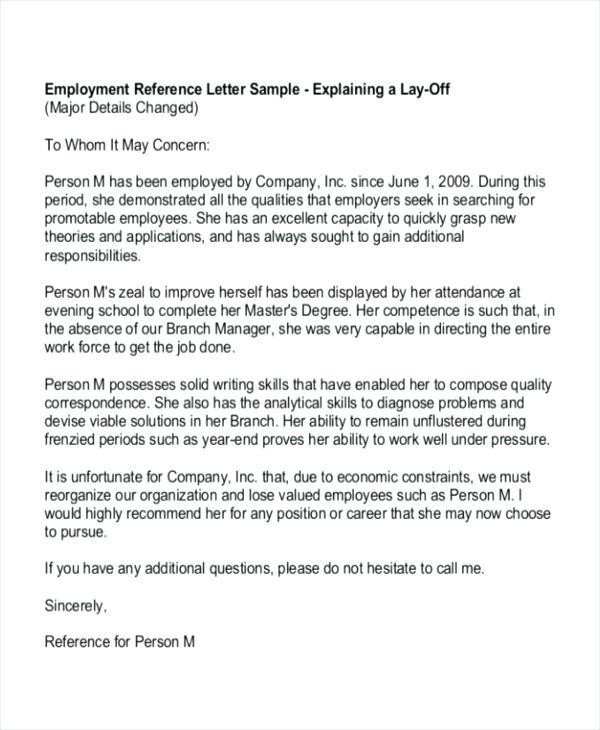
micxikine.me
Details
File Format
PDF
Size: 65 KB
Formal Reference Letter for Employment Example
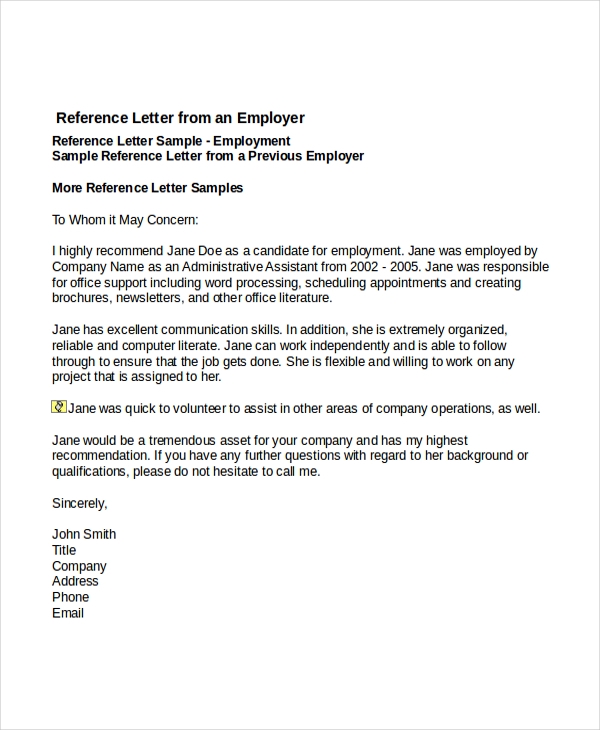
guve.securid.co
Details
File Format
PDF
Size: 60 KB
Professional Reference Letter for Employment Example

survivalbooks.us
Details
File Format
PDF
Size: 57 KB
The Importance of a Reference Letter for Employment
Along with an application letter and resume, a reference letter provides future employers with insight regarding an applicant’s personal background and capabilities. A well-written employee reference letter gives a potential employer more than they could obtain from a simple call to the company’s human resources department. This is because writers have more time to think about what to include in the letter than in an on-the-spot conversation.
A reference letter can be beneficial to a job applicant in a variety of ways. The letter simply serves as a supporting document that verifies an individual’s past performance in order to endorse the applicant in the best light.
Endorsement
A good reference letter may also be considered as an endorsement letter written for an individual seeking for a job position. Letters that are written by people who have actually worked with you in the past provide the best insight. This includes managers, supervisors, mentors, HRs, and other colleagues who can provide credible information about you and your work ethics. This will help convince a potential employer that you left your previous company under good terms and that your were a significant contributor to the department’s workforce.
Keep in mind that an employer would want to make sure that the reference giver was in a qualified position to determine your status. So to make the letter more convincing, it’s best to include the title and a brief background of the writer.
Qualifications
When requesting for a reference letter, be sure to share significant information about the desired position with the writer. This will help them determine the set of traits and skills that need to be emphasized that directly relate to the position you’re vying for. It might be best to use specific examples that show your accomplishments as well. The body of the letter should also include the numbers of years spent at the previous company, along with the awards and credentials that you’ve earned.
You can also provide the letter writer with your biographical data, employment history, and job responsibilities for further reference.
Personal Qualities
Apart from your professional capacities, the reference letter should also explain your personal qualities that make you suitable for the new position. This includes your ability to effectively communicate both verbally and written, along with your flexibility and willingness to accept a responsibility with no complaints, and how you showed initiative to accomplish a task without supervision. You can provide a few examples of situations that support these qualities to help make the letter more meaningful.
Perception
Another reason to get a reference letter is to find out how a former employer perceives your past work. If it’s something less than favorable, then you may not want to use it for your application. Otherwise, this could hinder your chances for landing the job. But if the reference letter happens to be appropriate enough to use, then this would make it easier for a potential employer to process your application.
Short Reference Letter for Employment Example
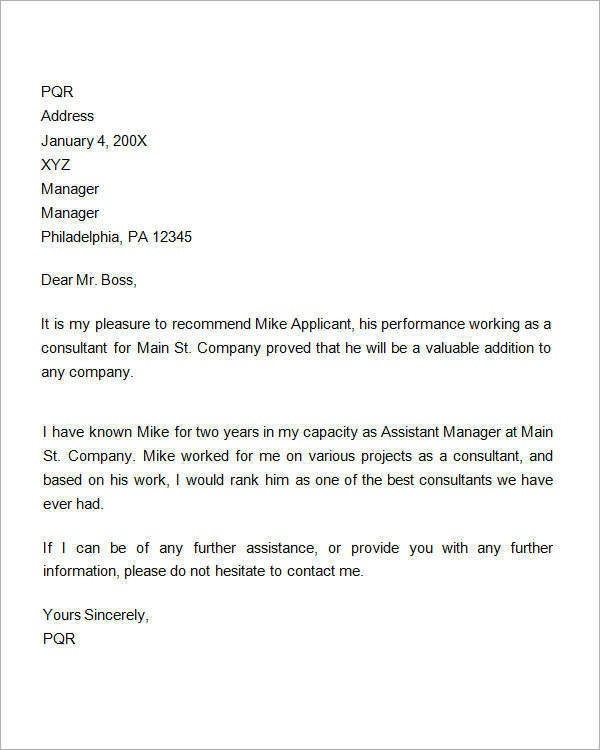
maggieoneills.com
Details
File Format
PDF
Size: 43 KB
Simple Reference Letter for Employment Example
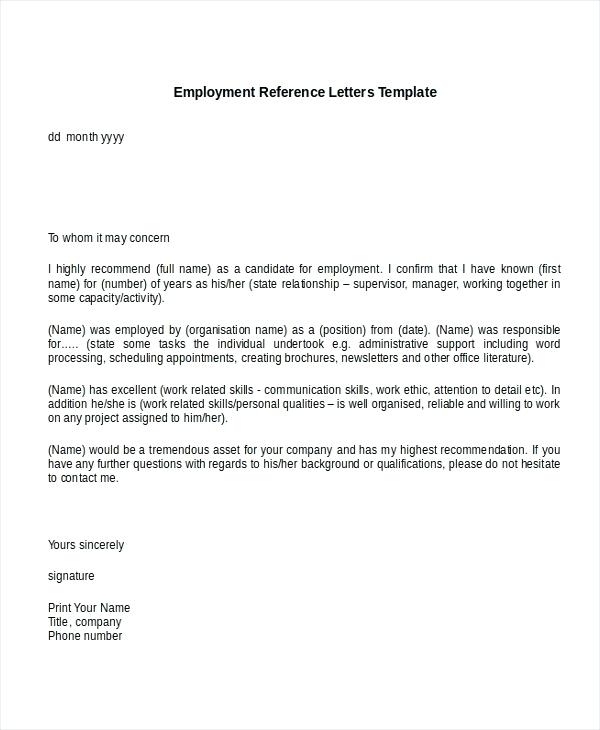
metroproper.com
Details
File Format
PDF
Size: 48 KB
Basic Reference Letter for Employment Example
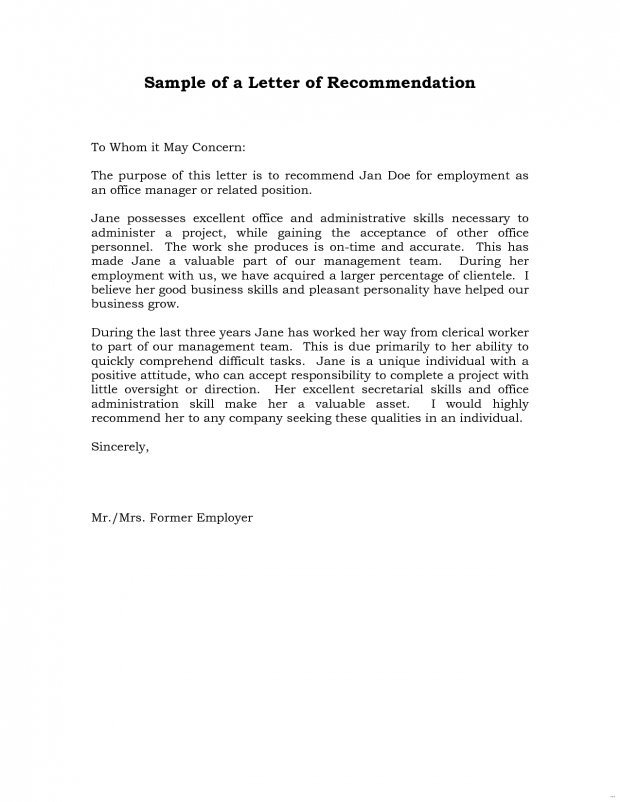
thinkpawsitive.co
Details
File Format
PDF
Size: 51 KB
Company Reference Letter for Employment Example
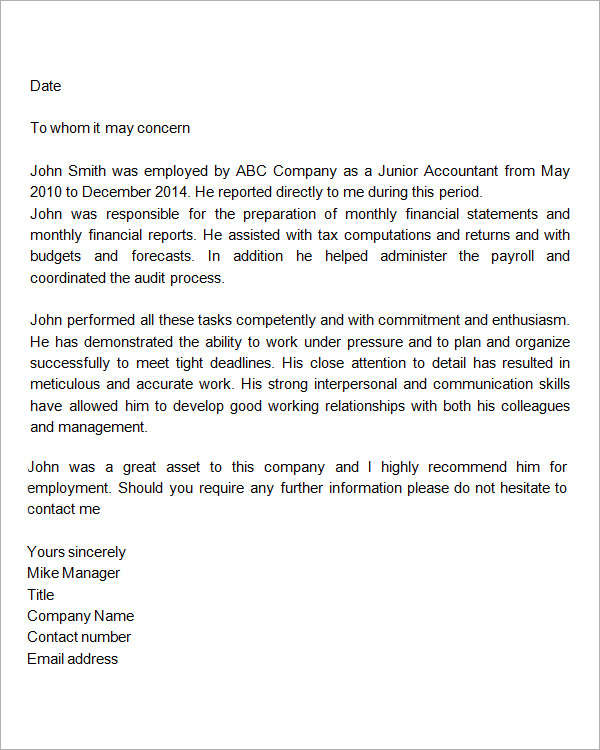
guve.securid.co
Details
File Format
PDF
Size: 78 KB
The Perfect Time to Get References
The best time to get a reference letter is before you’d actually need them. This could be at a time when you leave a school, a town, a job, and other similar instances. It might be difficult to acquire one when you’re no longer in touch with the proposed reference giver, and they might not have the freshest memory of their experience with you after a couple of months or so. By doing it at this time, you can collect a well-stocked resource of references ready to supply for immediate submission.
But how do you go about with your request?
Scrambling for a letter at the last minute is the last thing you’d want. So to help make things easier, let’s take a look at how you can professionally and effectively request for a reference.
Protocol for Requesting References
One thing to remember when requesting for a reference letter is to always be thoughtful regardless of the outcome. Creating a letter at the request of a former employee can take a good amount of time and effort from the writer’s day, which is why it’s important to make the process as easy and enjoyable as possible.
First, phrasing an open-ended question for your request will make it easier for a person to respond to. The person whom you are asking must have the opportunity to comfortably accept or decline your request for their own personal reasons. But if their response happens to be the latter, then you still need to remain considerate with their decision.
Secondly, once you receive a positive response, it’s your responsibility to provide helpful information to the writer. The writer must be made aware of the expected content, purpose, and letter format for quick and easy delivery. After the letter has been written, you can send a personal thank-you note to the writer to show your gratitude for their time and effort. This is a simple gesture that can make a person feel appreciated for what they’ve done.
Employer Reference Letter for Employment Example
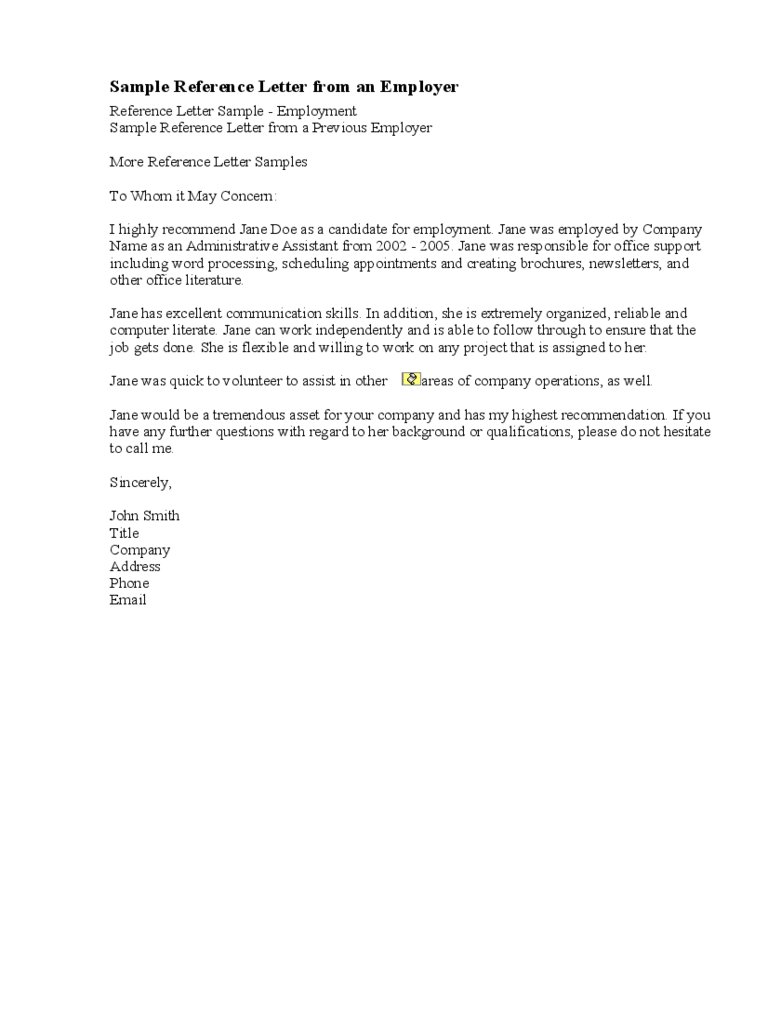
gopages.info
Details
File Format
PDF
Size: 60 KB
Reference Letter for Employment Template Example
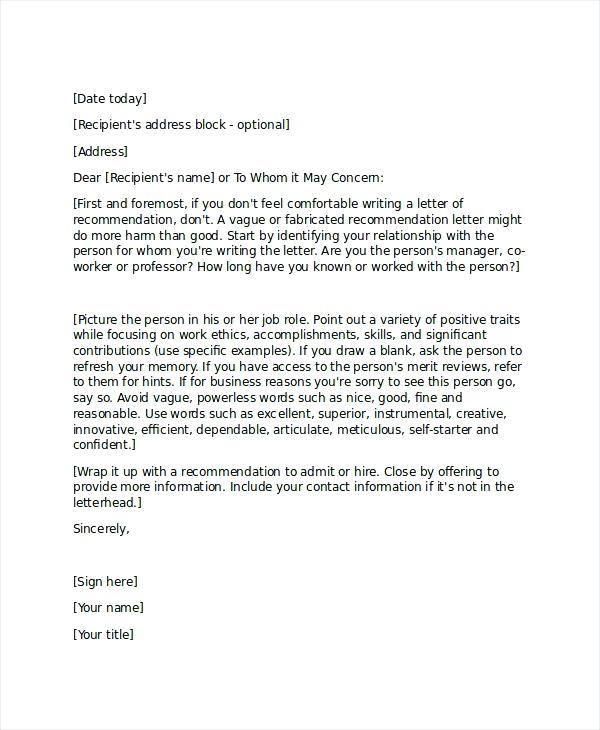
visitlecce.info
Details
File Format
PDF
Size: 65 KB
Standard Reference Letter for Employment Example
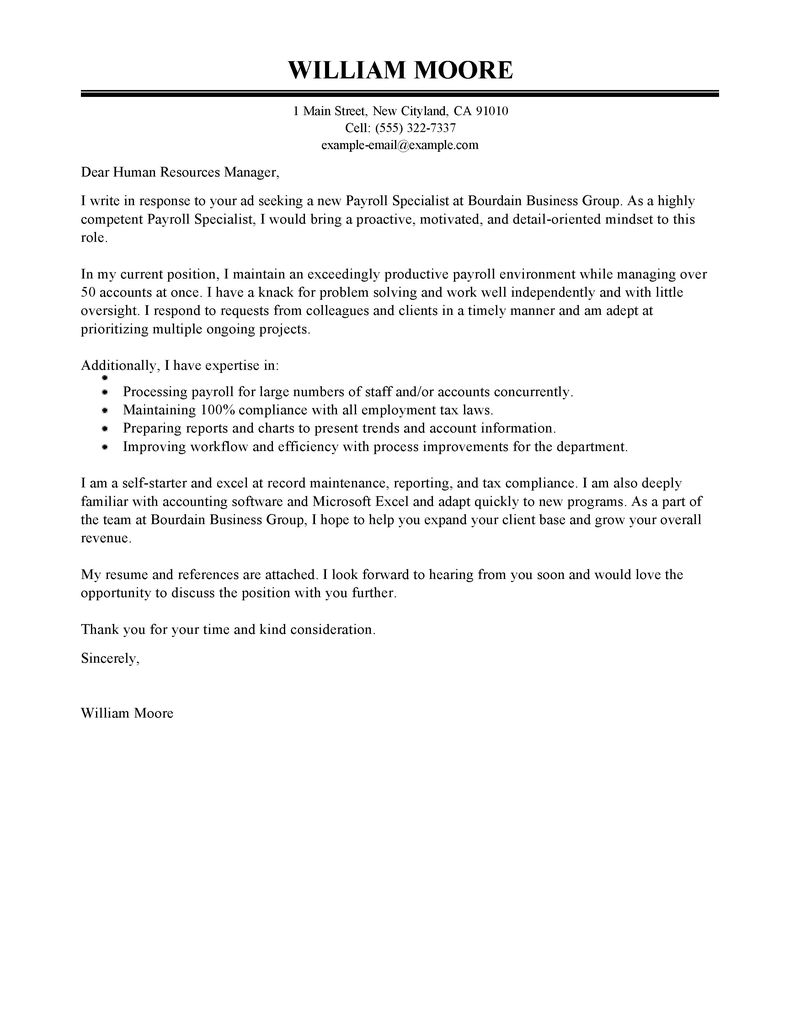
marevinho.com
Details
File Format
PDF
Size: 82 KB
How to Write a Reference Letter
Reference letters can be a useful document when you apply for a job, an internship, a volunteer position, a college, or a graduate program. This serves as a positive endorsement of your skills, attributes, and achievements which may be validated by someone who is familiar with your work, such as a friend, a teacher, or a previous employer. If you happen to be an eligible candidate for providing the reference, then there a few things to remember before you begin writing.
Think before agreeing.
Some people admit to saying “yes” to everything just to be polite. But a reference letter is a vital document that could influence a reader’s perception toward you, which is why you need to make sure that you can produce a positive letter before you agree to this request. Turning down a request might seem disappointing to the opposite party, but it’s a lot better to say “no” than to provide a negative reference that won’t help polish a person’s image.
If possible, you can suggest somebody in position who might agree to the request.
Get the details.
It might be a good idea to ask for a copy of the person’s resume or application to use as a point of reference. This ensures that the information you provide stays updated, including your current achievements and credentials. You can also ask for a copy on the job posting to tailor the letter according to a specific employment opportunity. Similarly, if you’re creating a student recommendation letter, you can ask for key information on the school and program offered. You must also know all the details on how the letter may be sent to its intended recipient.
What to Include
Unless you’re given a form to fill out to make the recommendation, you need to create a formal letter for the reference. But remember, a lengthy letter isn’t going to do you any favors. To ensure that the letter stays clear and concise, make sure it contains the following points:
Contact Details – If the letter is addressed to a specific individual or committee, then be sure to include their contact information at the top part of the letter.
Greetings – If your recipient’s name is available, then you may use a formal salutation such as “Dear Mr./Ms./Mrs. [Last Name],” at the beginning of letter. Otherwise, “To Whom it May Concern” would be the most suitable greeting when writing a general letter.
Introduction – Provide a brief explanation of your relationship with the subject. This includes the number of years you’ve known each other, your reason for writing, as well as your position to write the recommendation. If possible, you can also state the name of the company or school for which the subject is applying.
Body – The body of the letter should contain an overview of the subject’s character and skills. It’s important to be specific with these details to ensure that you’re conveying the right message. You’d want to be honest with your thoughts, but also sound convincing enough for a reader to believe your claims. Remember to relate specific cases where the subject has successfully demonstrated the qualities indicated in the letter.
Closing – In the closing paragraph of your letter, it’s important to offer additional information that can give the subject an extra push, as well as your contact details in case a verbal recommendation is required, or if they need to clarify a few things from the subject’s application.
Signature – Once finished, end the letter with your handwritten signature followed by your typewritten name. If the letter is sent via email, then you can simply use your typed name followed by your contact details. You also have the option to use a professional email signature to make it seem a lot more authentic.
Now that we’ve discussed the importance of a reference letter, along with how they may be requested and written, it’s time to put this knowledge into good use! With the proper knowledge and guidelines (and the possible help of a reference letter template), you’ll get a better chance of passing the application phase to bring you one step closer to your dream job.

